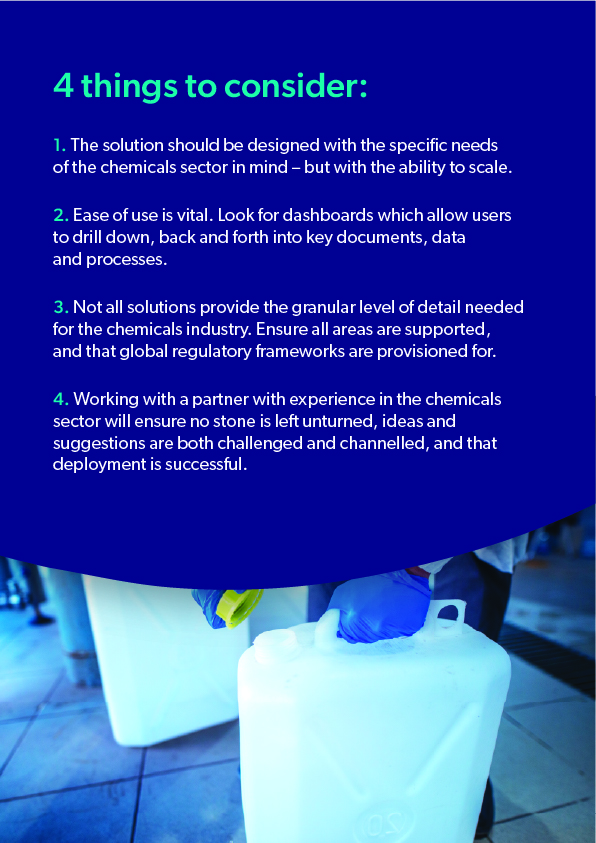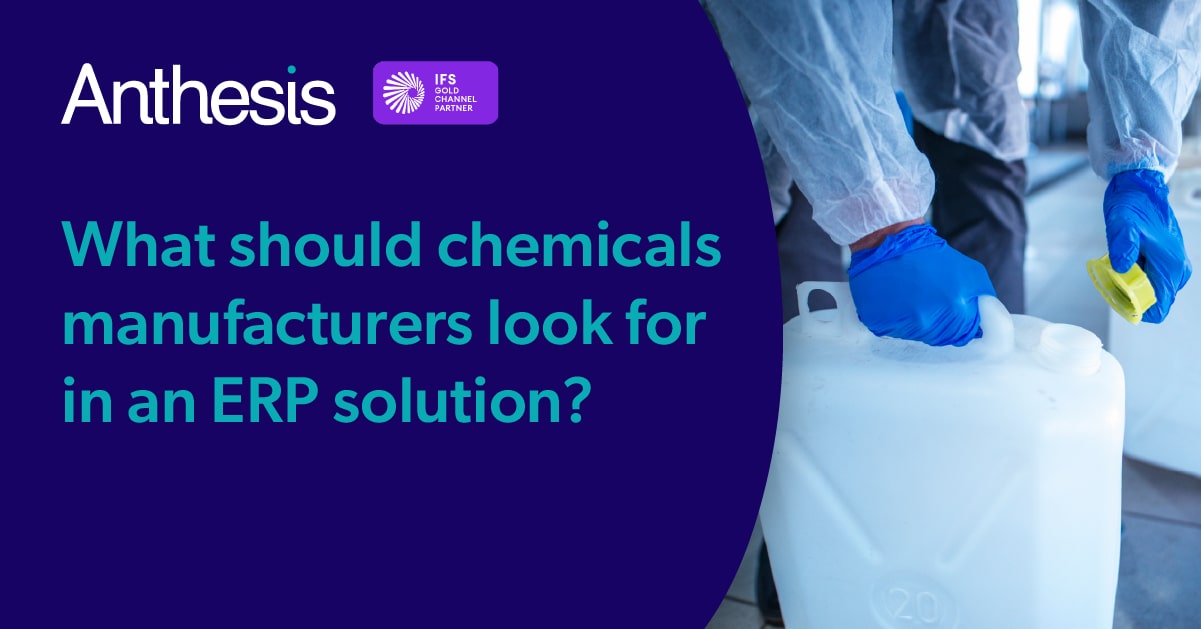How a modern ERP can help the UK chemicals industry embrace transformation, foster collaboration, and build market share.
As one of the most highly regulated industries, the chemicals sector faces a raft of ongoing and new challenges every day. In fact, a recent report by PwC concluded that while 90% of CEOs in the sector are bullish about their short term revenue growth prospects, this sentiment wanes significantly in the medium term. There are a number of reasons for this.
Financially, rising costs have seen margins squeezed tighter than ever before. Raw materials volatility and product commoditisation bring unrelenting pressures for manufacturers to do more with less. Operationally, there is little give. Careful management of processes, formulae and materials, as well as compliance with an ever-expanding list of requirements and regulations such as REACH; TSCA; and CSIA, means that risk is a massive consideration. Waste, cross-contamination and decay clearly come with huge cost penalties as well as safety considerations.
Strategically, increased competition, along with socio-political volatility, and environmental considerations, have converged to put a need for innovation and customer collaboration very much in the “prerequisite”, rather than “nice to have” box for UK based chemical manufacturers. An inability to respond to changes in both supply and demand, as well as at a regulatory level, can be hugely costly, both in real and reputational terms.

The rainbow after the storm
The good news is that in parallel with this seemingly perfect storm, digitalisation has brought with it, ways to work smarter, faster, more collaboratively, and with greater intelligence. Modern, industry-specific ERP platforms such as IFS marry traditional process mapping with digital transformation requirements, building the necessary resilience and agility to cement a foundation for future growth.
In the past, chemicals manufacturers typically turned to best-of-breed software solutions to address challenges around formulation management; production management; quality control; batch traceability; and reporting. However, such systems were often transactional and focused on record keeping rather than insight generating. They were also often heavily customised, restricting their ability to scale. Furthermore, a lack of cohesion and communication across these systems invariably impeded visibility and decision-making.
The availability of comprehensive, industry-specific solutions, designed to meet multiple business challenges with a single platform represents somewhat of a game-changer in curating a modern chemicals business.
Core capabilities
Crucially, mixed-mode manufacturing is fully supported in IFS, enabling chemicals manufacturers to prevent contamination of batches when it comes to blending and filling. The optimisation of sequencing and scheduling reduces changeover times to maximise production capacity and throughput. Taking this a step further where needed, IFS helps with dangerous goods classification through substance tracking in chemicals and comes with warehouse controls built in; preventing hazardous combinations or incorrect stocking in storage spaces and ensuring correct procedure & safety when handling goods.
Compliance with regulatory frameworks such as REACH; TSCA; and CSIA, is simplified, reducing data duplication through easy access to key documents and product-handling data. IFS brings audit compliance, planning, quality control and manufacturing execution into a single point with live data at all times, represented in clear, easy to configure dashboards and with simple, back and forth tracing of components and processes. Many IFS users have removed hours from their trace processes simply by putting this data into a single system
The almost instant availability of documents via IFS Document Management, and key insights, ensures simple, but watertight, practices.
Finally, the platform deems costly integrations a thing of the past, with a single application encompassing precisely the functionality required. Not only does this reduce cost of ownership, it minimises maintenance and reduces risk.
Foresight with confidence
There is no doubt that the chemicals leaders in the future will embrace transformation, leverage the best digital capabilities, and collaborate to identify and embrace the best market opportunities.
The ERP solution IFS provides for the chemicals sector not only harnesses multi-faceted complexity to deliver the insight and foresight to remain one step ahead, it delivers 17% average productivity gains, 14% faster product delivery times and 10% more orders delivered in a timely manner. In turn, this instils the confidence necessary to carve out new revenue models which will build all important market share, and promote sustainability, in the economies of the future.
Are you working in chemical manufacturing and want to embrace digitalisation to maximise production capacity, remain compliant and enhance visibility? Let Anthesis give you a view into how IFS Cloud can do it all in a single application without integrations or third-party products.



